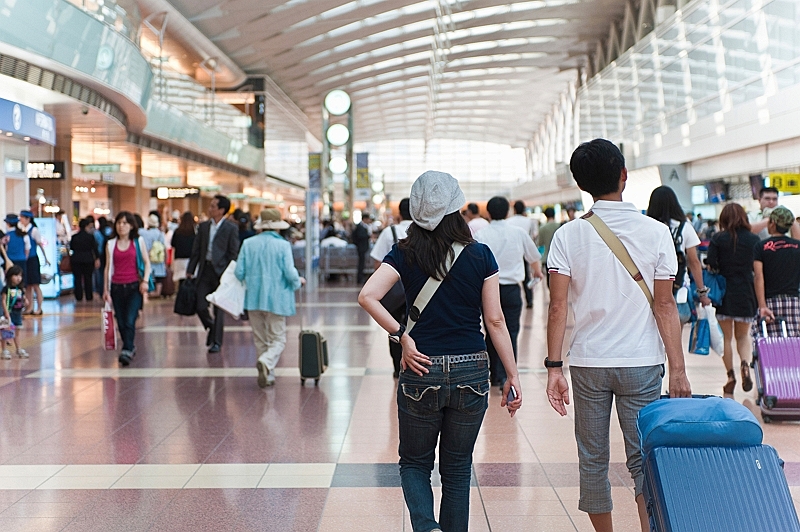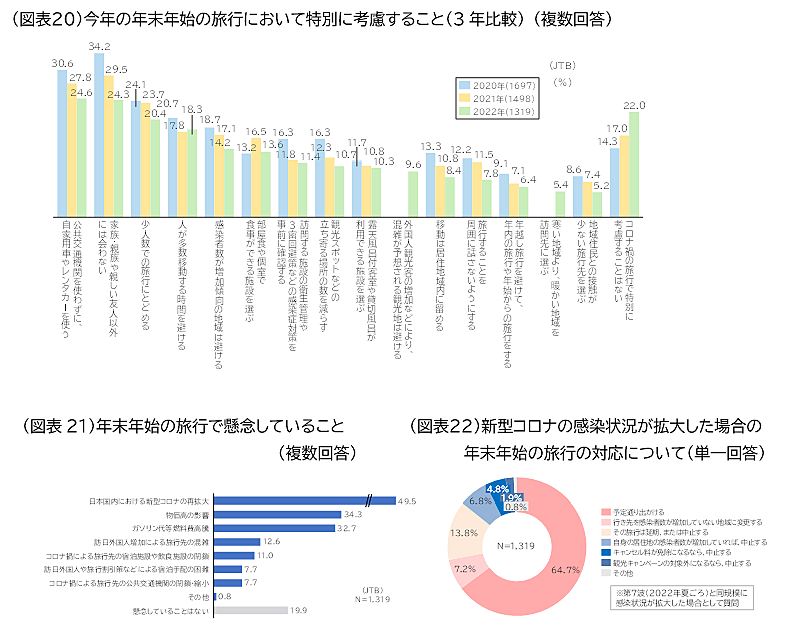
JTB announced travel trends in this coming New Year holidays between December 23 2022 and January 3 2023, based on consumer survey, economic indexes and its booking status.
The survey results, performed between December 11 and 17 2022, show that the ratio of people who plan to travel (including ‘likely’) accounted for 16.3%, 0.6 lower points than a year ago or 3.7% lower points than 2019.
Also, the ratio of people who want to spend less money than the last year was up 1.1 points to 14.9%, and the ratio of people who want to reduce travel frequencies was 11%, which was higher than the ratio of ‘increase.’
JTB has forecasted that domestic travelers will increase by 16.7% year on year to 21 million, which will be 28.2% fewer travelers than 2019. The average travel expenses will be up 12.1% to 37,000 JPY, which will be 15.6% more than even 2019, mainly because of an increase in longer travelers, a rise of accommodation expenses and prices.
The largest ratio of travel expenses per traveler was found in ’10,000 JPY to 20,000 JPY’ with 23%, followed by ’20,000 JPY to 30,000 JPY (18.7%)’ and ‘less than 10,000 JPY (16.4%).’ The large growth rates were especially found in ’40,000 JPY to 50,000 JPY’ and ’70,000 JPY to 100,000 JPY.’
Regarding length of travel, the largest ratio was found in ‘two-days and one-night’ with 35.6%, followed by ‘three-days and two-nights (28.6%),’ ‘four-days and three-nights (15.5%)’ and ‘five-days and four-nights (7.8%).’
Travel to urban areas is preferred again
The most poplar travel companion was ‘with a family (60%).’ Among a family, ‘with children (younger than junior high school)’ was the highest with 24.3%, and ‘married couple’ reduced to 18.3%, while ‘with others (mother and daughter or three-generations)” increased to 17.4%.
The most-interested destination was ‘a destination to enjoy seasonal shopping (14.3%), followed by ‘a destination to enjoy nature (12.8%)’ and ‘Tokyo Disneyland (10.1%).’
The most-selected transportation was ‘private car (59.7%)’ even though gas price is higher. The ratios of airlines (13.3%) and ferries or ships (1.9%) were higher than a year ago.
The most-selected accommodation was ‘hotel’ with 43.1%, which were higher than 34.6% a year ago. JTB said that travels to urban areas have been preferred again.
65% say ‘traveling as planned even though the 8th wave is coming’
As the 8th wave of COVID-19 is concerned, the most-careful action was ‘using a private car or a rent-a-car (24.6%)’ followed by ‘not meeting other people than family members, relatives or close friends (24.3%)’ and ‘traveling with a smaller group (20.4%).’ The ratios, however, were smaller than a year ago.
9.6% said that they want to avoid busy destinations with more international travelers, and the ratio of people who do not care about COVID-19 was 22%, 5.0 higher points than a year ago.
Even if COVID-19 cases increase again in the same way as the 7th wave in the summer of 2022, 64.7% said that they would travel as planned, while 13.8% said that they would postpone or cancel planned travels.
 報道資料より
報道資料より
Nearly 50% are still wating and seeing for traveling abroad
JTB has forecasted that Japanese outbound travelers will be up 650% year on year to 150,000, but the estimated figure is 18.1% smaller than 2019. The average travel expenses per traveler are estimated at 260,000 JPY, which are the highest since 2000 mainly because of rises in prices, airfares and fuel surcharges.
According to the survey results, 22.3% said that they will not travel overseas until March 2023 because of uncertainties in geopolitics and COVID-19, and 21.8% said because of weak yen or rise in prices.
 Travel Voice | Japanese Travel Trade News Japan's No.1
Travel Voice | Japanese Travel Trade News Japan's No.1